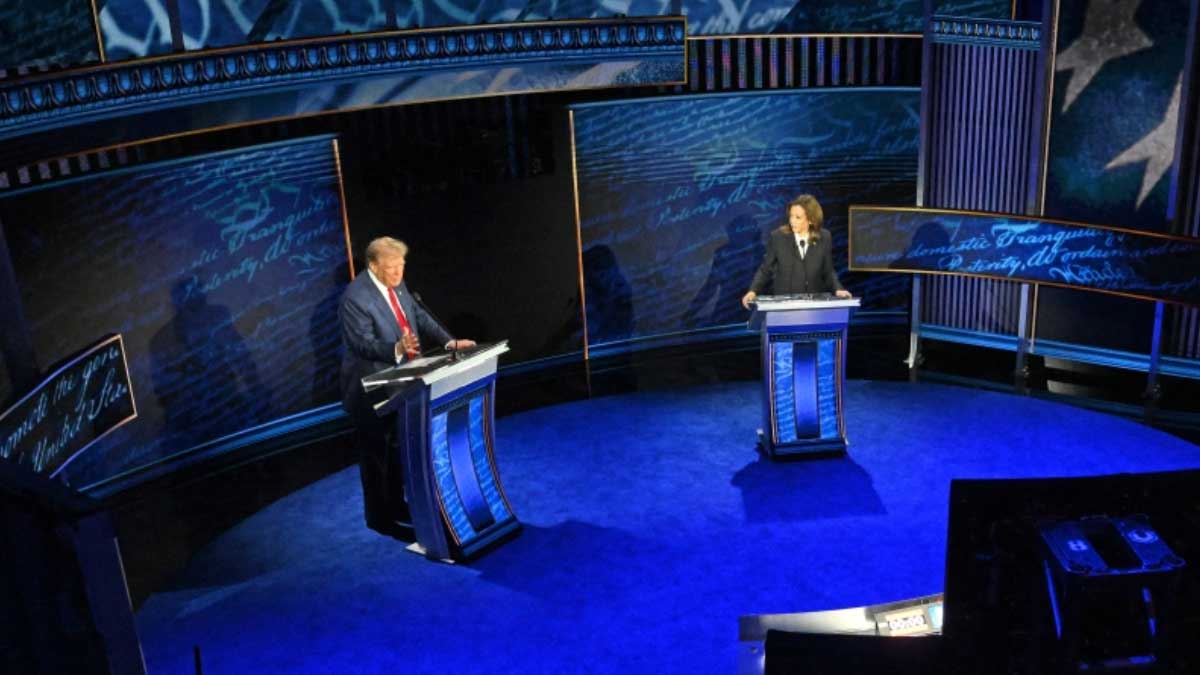- Home
- Billionaires
- Investing Newsletters
- 193CC 1000
- Article Layout 2
- Article Layout 3
- Article Layout 4
- Article Layout 5
- Article Layout 6
- Article Layout 7
- Article Layout 8
- Article Layout 9
- Article Layout 10
- Article Layout 11
- Article Layout 12
- Article Layout 13
- Article Layout 14
- Article Sidebar
- Post Format
- pages
- Archive Layouts
- Post Gallery
- Post Video Background
- Post Review
- Sponsored Post
- Leadership
- Business
- Money
- Small Business
- Innovation
- Shop
Recent Posts
Trump Rejects Harris Rematch, Cites Debate Bias

Former President Donald Trump has firmly rejected the idea of engaging in another debate with former Vice President Kamala Harris, asserting that she was decisively defeated in their most recent encounter. Trump’s dismissal of a rematch came after Harris publicly challenged him to another face-off. In a critique posted on Truth Social, Trump drew an analogy with UFC fighters, who, after losing a fight, often demand a rematch with fervent declarations such as “I DEMAND A REMATCH, I DEMAND A REMATCH!” Trump questioned the necessity of a second debate, suggesting that Harris’s performance was so inadequate that it didn’t warrant another round.
Earlier on Wednesday, Trump took to Fox News to accuse ABC News of showing favoritism towards Harris during their debate. He criticized the network for what he described as a “rigged deal,” referring to the debate moderators, David Muir and Linsey Davis, whom he claimed disproportionately fact-checked him. Trump’s allegations imply that the debate was unfairly tilted in Harris’s favor, with the moderators’ scrutiny serving to disadvantage him. Despite this, Trump proclaimed himself the victor of the debate and indicated that he was not inclined to participate in a subsequent debate.
Trump’s comments also included a preference for a debate hosted by Fox News if he were to agree to another one. However, he made it clear that he would not want Fox News anchors Martha MacCallum and Bret Baier to moderate, citing their critical coverage of his previous debate performance. Fox News has already proposed hosting a second presidential debate with MacCallum and Baier in October. Additionally, NBC has suggested holding a debate later this month. Trump’s preference for a different hosting arrangement reflects his dissatisfaction with the previous debate format and his strategic approach to future debates.
The situation became more complex with a contradictory statement from Trump’s adviser, Jason Miller, who suggested on CNN that Trump might still participate in a second debate. Miller indicated that the responsibility to agree to a rematch was on Harris, rather than Trump. This statement diverges from Trump’s outright dismissal, adding uncertainty to the debate’s potential future.
Harris’s campaign, meanwhile, has expressed readiness for another debate. In a fundraising email, the Harris team highlighted the Vice President’s eagerness to engage in a second debate, questioning whether Trump would be willing to participate. This proactive stance from Harris’s campaign suggests that they see value in continuing the debate discourse and are positioning themselves to capitalize on any additional opportunities for public engagement.
In an unexpected development, both Trump and Harris attended the September 11 memorial services in New York City on Wednesday. During the event, they exchanged brief, seemingly cordial words, indicating a degree of mutual respect despite their political rivalry. The ceremony also saw former New York City Mayor Michael Bloomberg, a notable supporter of President Joe Biden’s 2024 re-election campaign, positioned between Trump and Biden, underscoring the high-profile nature of the event.
The aftermath of the debate saw Harris making significant gains in presidential betting markets. Her chances of winning the election surged by more than four and a half points within 24 hours, according to the Election Betting Odds tracker. In contrast, Trump’s odds decreased by four points, reflecting a shift in the betting public’s perception of the candidates’ standings following the debate.
The debate itself, which took place in Philadelphia and was broadcast by ABC News, was a critical moment in the 2024 campaign. Over the course of the 90-minute debate, Trump and Harris tackled various pressing issues, including the economy, abortion, and international conflicts such as the wars in Ukraine and Israel. Harris’s performance was notable for her persistent challenges to Trump, prompting him to engage in defensive responses. Her ability to provoke Trump into defensive outbursts was widely praised by commentators, who noted that her strategy effectively highlighted Trump’s vulnerabilities. Harris’s pointed critiques included remarks about Trump’s rally attendance, his 2020 election loss to “81 million people,” and his lack of respect from global leaders, labeling him a “disgrace” and “weak.”
Trump’s reluctance to engage in another debate underscores his dissatisfaction with the previous encounter and his broader campaign strategy. As both candidates navigate the evolving debate landscape, the potential for future debates remains a topic of significant interest and strategic maneuvering.
Recent Posts
Categories
- 193 Countries Consortium Partner1
- 193cc Digital Assets2
- 5G1
- Aerospace & Defense48
- AI37
- Arts3
- Banking & Insurance11
- Big Data3
- Billionaires1,261
- Boats & Planes1
- Business332
- Careers13
- Cars & Bikes79
- CEO Network1
- CFO Network17
- CHRO Network1
- CIO Network1
- Cloud10
- CMO Network18
- Commercial Real Estate7
- Consultant1
- Consumer Tech194
- CxO1
- Cybersecurity73
- Dining1
- Diversity, Equity & Inclusion4
- Education7
- Energy8
- Enterprise Tech29
- Events11
- Fintech1
- Food & Drink2
- Franchises1
- Freelance1
- Future Of Work2
- Games149
- GIG1
- Healthcare79
- Hollywood & Entertainment203
- Houses1
- India’s 1000 Richest1
- Innovation46
- Investing2
- Investing Newsletters4
- Leadership65
- Lifestyle11
- Manufacturing1
- Markets20
- Media327
- Mobile phone1
- Money13
- Personal Finance2
- Policy569
- Real Estate1
- Research6
- Retail1
- Retirement1
- Small Business1
- SportsMoney42
- Style & Beauty1
- Success Income1
- Taxes2
- Travel10
- Uncategorized13
- Vices1
- Watches & Jewelry2
- world's billionaires1,230
- Worlds Richest Self-Made Women2
Related Articles
South Korea Plane Crash: A Tragic Loss and Global Mourning
The tragic plane crash at South Korea’s Muan International Airport on Sunday...
By 193cc Agency CouncilDecember 30, 2024H-1B Visa Debate Splits Trump Allies and Silicon Valley
The debate over H-1B visas has once again become a contentious issue,...
By 193cc Agency CouncilDecember 28, 2024Trump Moves $4B Stake in Truth Social Parent, Stock Drops 6%
Donald Trump recently transferred his 57% stake in Trump Media & Technology...
By 193cc Agency CouncilDecember 20, 2024House Rejects Trump-Backed Funding Bill, Shutdown Looms
The U.S. House of Representatives rejected a new government funding bill on...
By 193cc Agency CouncilDecember 20, 2024















Leave a comment